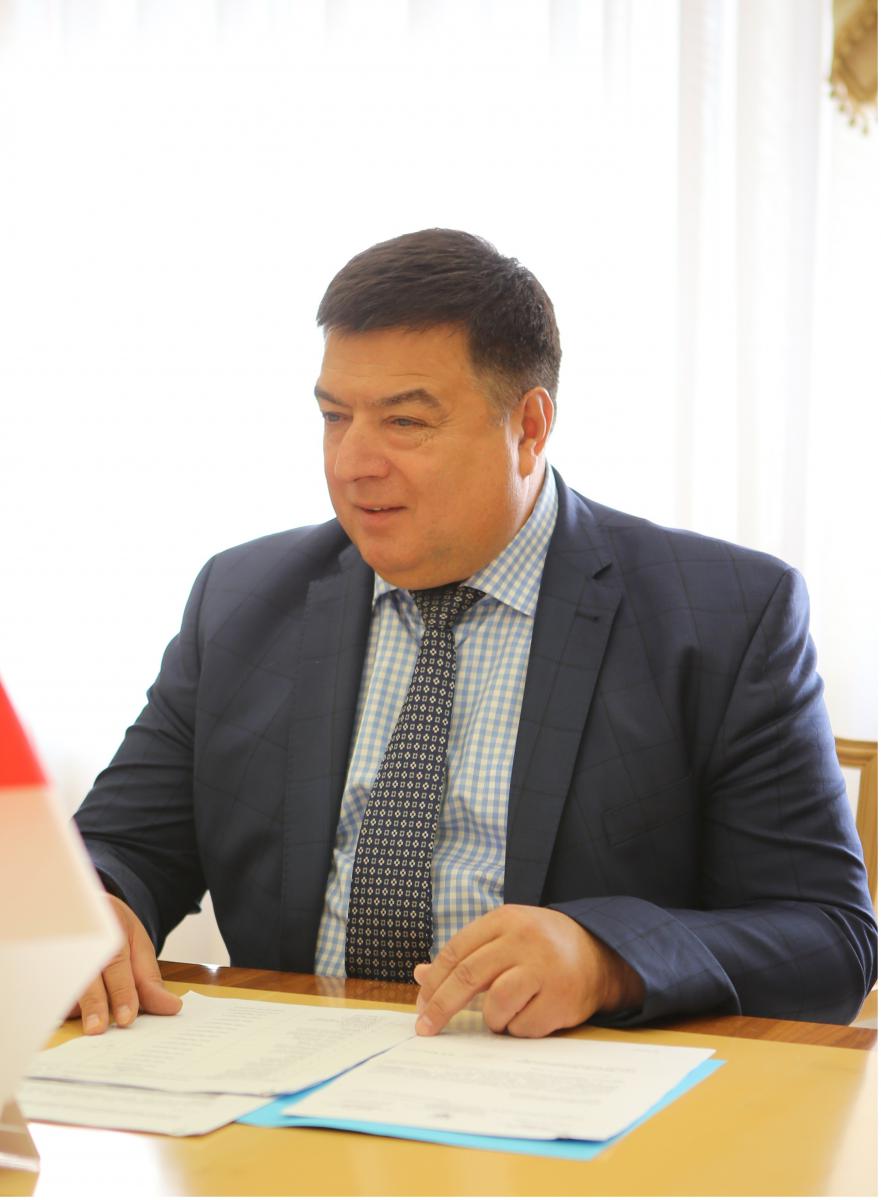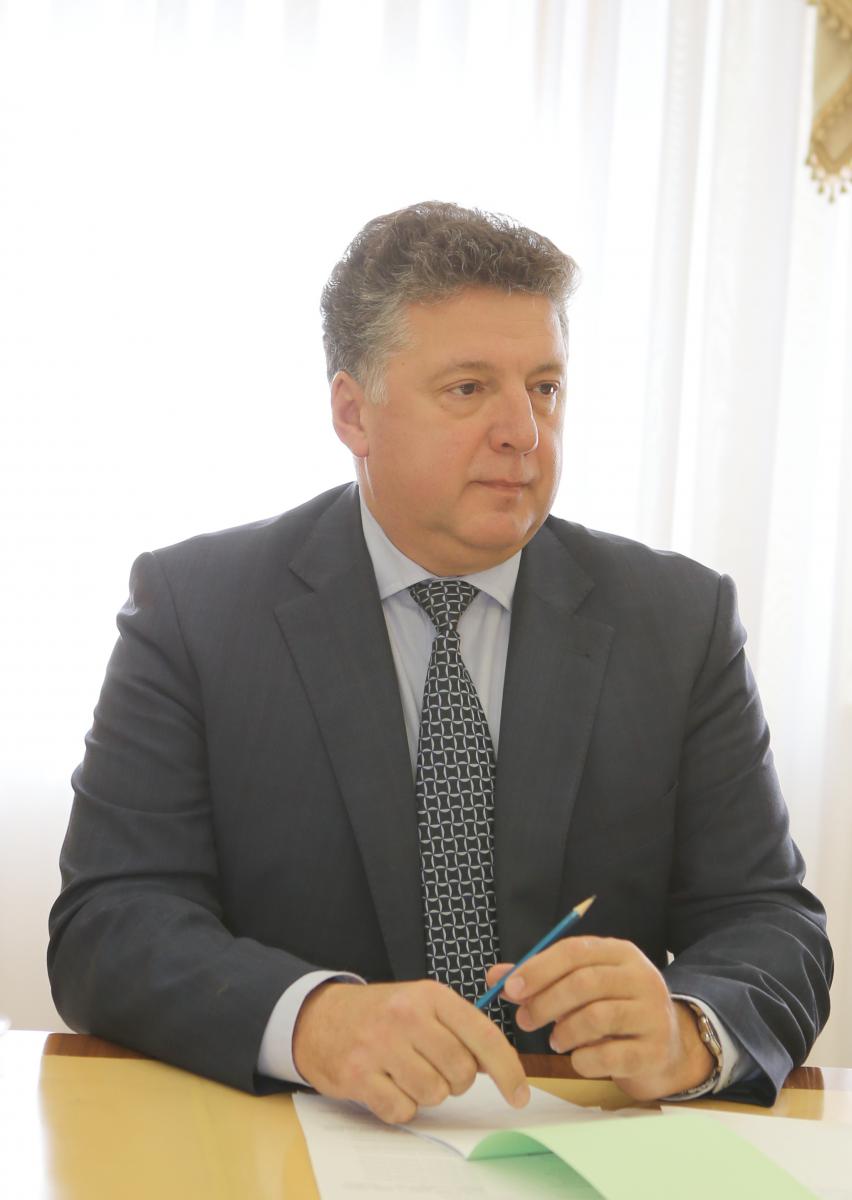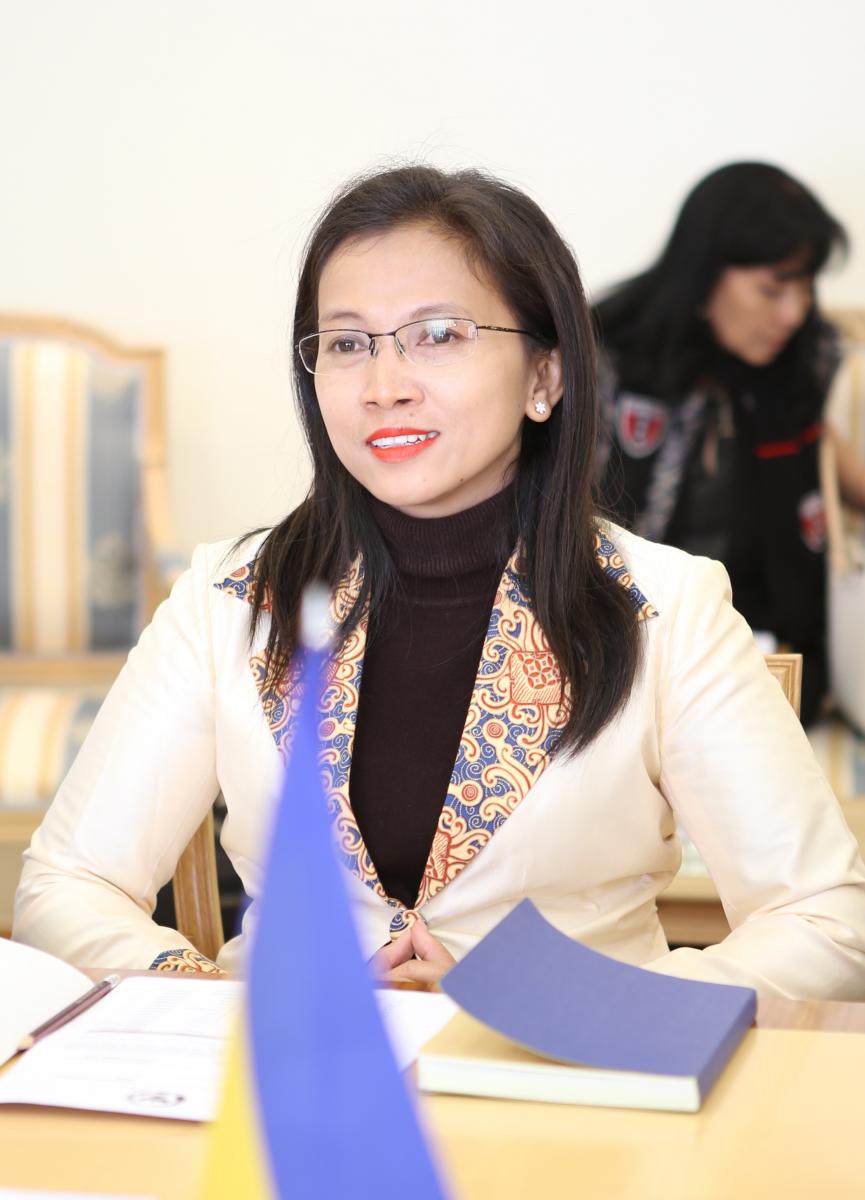The Constitutional Court of Ukraine held a working meeting
with the delegation of the Constitutional Court of the Republic of Indonesia
26.09.2018
Acting Chairman of the Constitutional Court of Ukraine Oleksandr Tupytskyi and Judge of the Constitutional Court of Ukraine Viktor Horodovenko held a working meeting with the delegation of the Committee of legal affairs, human rights and security of the People's Representative Council (Parliament of the Republic of Indonesia) and Extraordinary and Plenipotentiary Ambassador of the Republic of Indonesia to Ukraine Yuddy Chrisnandi.
The meeting was attended by the Head of the Committee of legal affairs, human rights and security of the People's Representative Council Erma Suryani Ranik, Members of the Committee Herman Herry Adranacus, John Kenedy Azis, Mulyadi, Mohammad Toha, Al Muzzammil Yusuf, Hasrul Azwar, Teuku Taufiqulhadi, Dossy Iskandar Prasetyo, Muhammad Azis Syamsuddin, First Secretary for Economic Affairs of the Embassy of the Republic of Indonesia to Ukraine Datu Putra Persada, Head of the Political Department of the Embassy of the Republic of Indonesia to Ukraine Yusran Hadromi, Head of Protocol Unit of the Embassy of the Republic of Indonesia to Ukraine Argo Budi Prakoso, Head of the Secretariat of the Constitutional Court of Ukraine Yaroslav Vasylkevych.
Acting Chairman of the Constitutional Court of Ukraine Oleksandr Tupytskyi informed the guests regardi ng the history of the establishment of the Constitutional Court of Ukraine, the principles of its functioning, structure, requirements for Judges of the Constitutional Court of Ukraine, as well as the procedure for their appointment and dismissal. He noted that Ukraine's independence was proclaimed on August 24, 1991, but it was only six years after the adoption of the Constitution of Ukraine and the Law of Ukraine “On the Constitutional Court of Ukraine”, that the Constitutional Court of Ukraine, as the sole body of constitutional jurisdiction began to operate in our country.
ng the history of the establishment of the Constitutional Court of Ukraine, the principles of its functioning, structure, requirements for Judges of the Constitutional Court of Ukraine, as well as the procedure for their appointment and dismissal. He noted that Ukraine's independence was proclaimed on August 24, 1991, but it was only six years after the adoption of the Constitution of Ukraine and the Law of Ukraine “On the Constitutional Court of Ukraine”, that the Constitutional Court of Ukraine, as the sole body of constitutional jurisdiction began to operate in our country.
As to the status of the Judges of the Constitutional Court of Ukraine, it was indicated that they are elected for nine years without the right to be reappointed. A citizen of Ukraine who has command of the state language, has reached the age of forty as of the day of the appointment, has higher legal education and least fifteen years of professional experience in the field of law, high moral character, and is a lawyer with a recognised level of competence, shall be eligible to become a Judge of the Constitutional Court.
Oleksandr Tupytskyi also noted that in 2016 amendments to the Constitution of Ukraine were introduced in the area of justice, and subsequently, taking into account these changes, a new Law of Ukraine “On the Constitutional Court of Ukraine” was adopted. Also, according to him, the Court is be composed of eighteen judges of the Constitutional Court, with the President of Ukraine, the Verkhovna Rada of Ukraine and the Congress of Judges of Ukraine each appointing six judges of the Constitutional Court. The Judge of the Constitutional Court of Ukraine shall become empowered upon taking the oath at a special plenary session of the Court no later than the fifth working day after the appointment of a Judge to office.
In addition, Oleksandr Tupytskyi responded to questions from guests in respect of activities of the constitutional control body of Ukraine, and informed regarding recent election of Judges of the Constitutional Court of Ukraine by the quota of the Verkhovna Rada of Ukraine.
 Judge of the Constitutional Court of Ukraine Viktor Horodovenko emphasised that the Constitutional Court of Ukraine is the main independent body of state, which is responsible for observance of the Constitution of Ukraine. He mentioned achievements of the constitutional reform in Ukraine, in particular, regarding the selection of the judges of the Constitutional Court of Ukraine, and dwelled on this procedure in detail.
Judge of the Constitutional Court of Ukraine Viktor Horodovenko emphasised that the Constitutional Court of Ukraine is the main independent body of state, which is responsible for observance of the Constitution of Ukraine. He mentioned achievements of the constitutional reform in Ukraine, in particular, regarding the selection of the judges of the Constitutional Court of Ukraine, and dwelled on this procedure in detail.
The speaker noted that the selection of candidates for the position of the Judge of the Constitutional Court of Ukraine is carried out on a competitive basis. According to him, each branch of the government forms its own commission for the election of Judges of the Constitutional Court of Ukraine. As regards the persons appointed by the President of Ukraine, the selection is made by the competition committee established by the President of Ukraine; in the Verkhovna Rada of Ukraine, by the committee which competence includes this issue, while the Council of Judges of Ukraine is considering the candidatures from the Congress of Judges of Ukraine, the Judge added.
Responding to the questions of the guests, the Constitutional Court of Ukraine Judge described the procedure for the promulgation of acts of the Constitutional Court of Ukraine. He noted that the publication of all acts of the Court upon the results of constitutional proceedings is carried out on the official website of the Court or, in some cases, by a court decision, in the courtroom, but not later than the next working day after the adoption. Also, the acts of the Court together with dissenting opinions of judges are published in the official publication “The Bulletin of the Constitutional Court of Ukraine”, summed up Viktor Horodovenko.
Ukraine”, summed up Viktor Horodovenko.
Head of the Committee of legal affairs, human rights and security of the People's Representative Council Erma Suryani Ranik informed about the upcoming reforms of the Constitutional Court of the Republic of Indonesia and the need to deepen the knowledge and experience of the leading constitutional courts in the world with a view to introduce effective changes to the constitutional justice of Indonesia. She dwelt upon the history, structure and status of the Constitutional Court of the Republic of Indonesia.
 The Head of the Committee noted that the Constitutional Court of the Republic of Indonesia was established in 2003 and consists of nine judges. The speaker noted that judges of the Constitutional Court are appointed upon the proposal of the authorities: the People's Representative Council, the Supreme Court and the President of Indonesia. The President of the Constitutional Court is elected by the judges and approved by the President, she added.
The Head of the Committee noted that the Constitutional Court of the Republic of Indonesia was established in 2003 and consists of nine judges. The speaker noted that judges of the Constitutional Court are appointed upon the proposal of the authorities: the People's Representative Council, the Supreme Court and the President of Indonesia. The President of the Constitutional Court is elected by the judges and approved by the President, she added.
At the end of the meeting, Extraordinary and Plenipotentiary Ambassador of the Republic of Indonesia to Ukraine Yuddy Chrisnandi thanked for the hospitality and experience that the Constitutional Court of Ukraine has kindly shared and expressed his hope that friendly relations between the constitutional courts of Ukraine and the Republic of Indonesia will be further developing in the spirit of constructive cooperation.
During the meeting, the interlocutors also discussed other relevant issues of constitutional justice in Ukraine, as well as ways of further cooperation in order to strengthen the institutional capacity of the constitutional courts of Ukraine and Indonesia.


